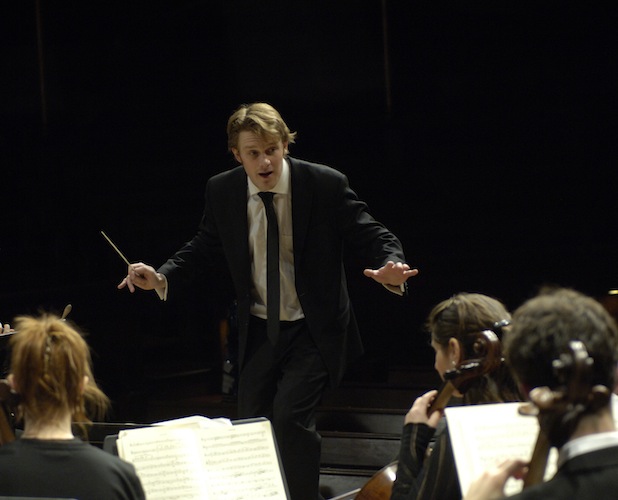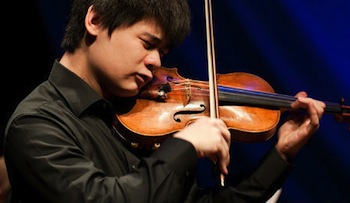Classical Concert Review: The Discovery Ensemble at Jordan Hall — A Group That is Growing Strong and Fast
The Discovery Ensemble’s precision was also on full display in the vigorous contrapuntal writing that came across with impressive, electrifying energy and visceral punchiness.
By Jonathan Blumhofer
Considering that the Discovery Ensemble only gives four concerts a season, it’s certainly welcome that they pack each program full. The first half of Sunday’s season finale at Jordan Hall clocked in at ninety minutes; the second at a not-too-paltry forty-five. Music director Courtney Lewis conducted pieces by Tchaikovsky, Beethoven, Stravinsky, and Haydn that, in characteristic Discovery Ensemble fashion, were linked in ways both obvious and subtle, providing a strong reminder of just how valuable and insightful little things like thoughtful programming can be.
To open the afternoon, Lewis led a crackling account of Tchaikovsky’s Serenade for Strings. The first movement, anchored by a soulful chorale, positively floated in its fast, middle section. The famous second movement waltz was filled with charm and elegance, while the third movement Elegy was charged with passion and pathos.
In the vigorous finale, Lewis delivered a well-paced reading that naturally emphasized the way Tchaikovsky tied up all of the work’s musical threads. The Discovery’s ensemble precision was also on full display in the vigorous contrapuntal writing that came across with impressive, electrifying energy and visceral punchiness.
Mongolian-born violinist Xiang Yu is the recipient of a host of prestigious awards, including top prizes in the Menuhin and Wieniawski Competitions. Currently enrolled at NEC, he studies with Kim Kashkashian and Donald Weilerstein. To judge from Sunday’s performance of Beethoven’s Violin Concerto, he certainly has impressive technical chops and a sweet tone in his upper register – in this, he reminded me repeatedly of Gil Shaham.
Unfortunately, though, on Sunday Yu didn’t seem to have much of a grasp of the concerto’s inner logic. Like so many major Beethoven scores, this is a piece that’s built on the most basic and fundamental of musical materials. In order to come to life, it needs to possess some sense of spontaneity, freshness, and energy.
Except for the cadenzas in the outer movements and the most of the middle movement, Sunday’s performance lacked all of those traits. Too often, Yu’s tone was rough-edged and his intonation wayward. What ought to flow naturally felt forced. His phrasing throughout the huge first movement regularly sounded leaden and square. In what should be a charming, jolly finale, Yu attacked the opening tune as though he were wielding a sledgehammer. For much of the concerto, there was simply an overriding sense that his goal was to get through the piece intact.
This all contrasted with his gripping accounts of the first and third movement cadenzas, and a highly satisfying rendition of the second movement, whose improvisatory qualities, in Yu’s hands, were placed, glowingly, front-and-center. Here he broke free of what Debussy called the “tyranny of the bar line” to deliver a focused, rhapsodic performance that is just what this piece needs to work. If only his whole interpretation could have demonstrated such attention to detail and musical understanding.
Aside from the lengthy first movement introduction, in this piece the orchestra is relegated mostly to a background role, though the Ensemble made their big moments count. They provided a tight, rhythmically alert accompaniment the rest of the time, ably following Lewis and Yu, whose dash through the finale almost caused the piece to come apart by the seams at a couple of junctures.
Stravinsky and Haydn have, in recent years, become two of the cornerstone composers of the Discovery Ensemble repertoire. On Sunday, the cool austerity of the original version of the former’s Symphonies for Wind Instruments contrasted nicely with the warmth and wit of the latter’s Symphony no. 102.
The Symphonies of Wind Instruments, written in memory of Debussy, is one of Stravinsky’s strangest, most haunting scores. It’s filled with unexpected instrumental combinations – alto flute and alto clarinet at one point, in a passage that sounds like it was cribbed from The Rite of Spring – and uncompromising dissonance. Lewis, in his opening comments, described the music’s overriding affect as being like watching something highly expressive unfold through a layer of glass, and there was a kind of icy clarity in Sunday’s reading, punctuated by squawking clarinets and ominous brass chorales.
It’s perfect foil was Haydn’s antepenultimate symphony. When Sunday’s performance really hit its stride, the Discovery’s reading brought to mind the great, 1960s-era recordings of the “London” Symphonies with Leonard Bernstein and the New York Philharmonic. Historically-informed they most certainly are not, but they’re fresh, bracing, and exhilarating nonetheless, just like most of this weekend’s run-through.
This is genial music – there’s the feeling throughout that Haydn isn’t out to prove anything; rather, he’s reveling in his mastery of the late-18th-century symphonic form – and Sunday’s performance was appropriately generous and broad. Brian Maloney gave a stirring account of the exposed timpani part and various subsets of the Ensemble (among other things, Haydn calls on just the first two stands of the string sections a few times during the piece) brought a welcome touch of variety and contrast to the proceedings. Particularly notable among the soloists were principal cello Michal Shein and principal flute Bianca Garcia.
Late last week, the Ensemble announced its 2014-15 season, which begins at Jordan Hall on October 26th with music by Bach, Elgar, Strauss, and Mozart. The rest of the season includes music by George Benjamin and Witold Lutoslawski, alongside more familiar fare by Johann Strauss, Schumann, Haydn, and Stravinsky. The group also takes on Beethoven’s Ninth Symphony for the first time in January, when they’re joined by vocal soloists and the Chorus Pro Musica. Special guests, including the BSO’s James Sommerville, Robert Sheena, and Anne Hobson Pilot, appear as soloists throughout the season. In all, it’s a promising-looking set of programs that builds nicely upon the groundwork laid by the Ensemble these past several years: this is a group that’s growing strong and fast.
Jonathan Blumhofer is a composer and violist who has been active in the greater Boston area since 2004. His music has received numerous awards and been performed by various ensembles, including the American Composers Orchestra, Kiev Philharmonic, Camerata Chicago, Xanthos Ensemble, and Juventas New Music Group. Since receiving his doctorate from Boston University in 2010, Jon has taught at Clark University, Worcester Polytechnic Institute, and online for the University of Phoenix, in addition to writing music criticism for the Worcester Telegram & Gazette.


